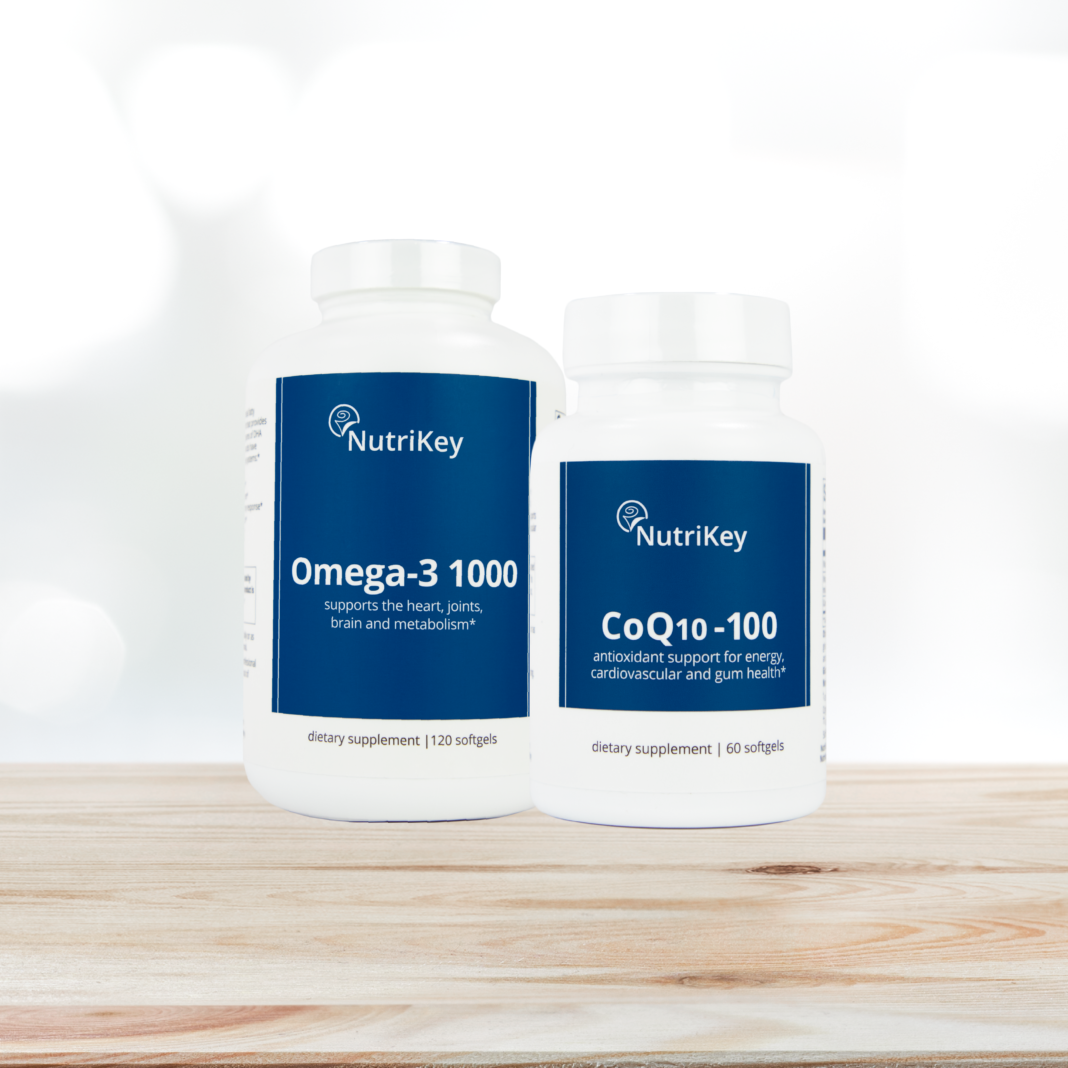February is Heart Month, a perfect time to focus on strategies for maintaining and improving cardiovascular health. Among the most effective supplements for heart health are Coenzyme Q10 (CoQ10) and Omega-3 fatty acids. Both are powerful in their own right, but they serve distinct functions. The question on many people’s minds is: “Should I take CoQ10 or fish oil for heart health?” The truth is, both can benefit the heart, but they work in different ways. Together, they form a formidable team that can support heart health, fight inflammation, and help with cholesterol management.
The Heart-Healthy Benefits of Omega-3s
Omega-3 fatty acids are considered essential fats because our bodies cannot produce them naturally. This means we must obtain them from food sources or supplements. Omega-3s are crucial for reducing inflammation, supporting heart health, and improving overall well-being. There are a few different types of Omega-3 fatty acids, but the two most important for heart health are EPA (Eicosapentaenoic acid) and DHA (Docosahexaenoic acid). Both of these are found in fatty fish, often referred to by the acronym SMASH: sardines, mackerel, anchovies, salmon, and herring.
Despite their well-documented benefits, most people are not getting enough Omega-3s in their diet. In fact, studies show that 98% of individuals are deficient in these essential fats. With such a widespread deficiency, it’s no wonder that Omega-3 supplementation has become a popular choice. For general heart health, a daily intake of 3,000 mg of Omega-3 is often recommended, which can be achieved with supplements or by consuming fatty fish. For example, a 4-ounce serving of salmon provides about 2,000 mg of Omega-3s, but most people fall short of eating enough fish to reach optimal levels.
While plant-based sources like walnuts, chia seeds, and flaxseeds contain Omega-3s as well, they provide ALA (Alpha-Linolenic Acid), a form of Omega-3 that the body must convert into EPA and DHA. This conversion process is inefficient, making fish oil supplements the best option for ensuring sufficient intake of the heart-healthy Omega-3s EPA and DHA.
Omega-3 fatty acids play a key role in reducing inflammation, which is a major risk factor for heart disease. In addition, they can help lower blood pressure, improve cholesterol levels, and reduce the risk of atherosclerosis (plaque buildup in arteries). Supplementing with Omega-3s may also help increase HDL (good) cholesterol while lowering LDL (bad) cholesterol and triglycerides, all of which contribute to a healthier heart.
Why Add CoQ10 to the Mix?
CoQ10 is another powerhouse supplement for heart health. Known as Coenzyme Q10, this antioxidant is naturally produced by the body and is essential for energy production within our cells. CoQ10 is found in high concentrations in energy-demanding organs such as the heart, kidneys, and liver, which rely on a steady supply of energy to function properly. Think of CoQ10 as the spark plug that fuels your body’s engine, ensuring that organs like the heart continue to run efficiently.
As we age, our body’s production of CoQ10 naturally decreases, and certain health conditions—like diabetes and neurodegenerative diseases—can further deplete CoQ10 levels. Additionally, medications like statins, which are commonly prescribed to lower cholesterol, can interfere with the body’s ability to produce CoQ10. This is one reason why many individuals on statins experience side effects such as muscle aches and fatigue.
CoQ10 helps to combat these side effects, making it a beneficial supplement for those on statin therapy. It also supports overall cardiovascular health by enhancing energy production, boosting metabolism, and protecting cells from oxidative damage caused by free radicals. For people with gum disease, CoQ10 has been shown to help reduce inflammation and improve gum health, making it a useful addition for those dealing with dental issues as well.
CoQ10 and Omega-3s: A Heart-Healthy Combo
Both CoQ10 and Omega-3s contribute to cardiovascular health, but they serve different functions. Omega-3 fatty acids primarily work by reducing inflammation, improving cholesterol levels, and supporting overall heart function. CoQ10, on the other hand, helps to improve energy production at the cellular level, which is crucial for maintaining heart health, especially as we age or deal with health conditions that deplete CoQ10 levels.
Interestingly, these two supplements work well together. Omega-3s provide anti-inflammatory benefits, while CoQ10 supports cellular energy and protects the heart from oxidative stress. For individuals dealing with heart issues, high cholesterol, or even the side effects of statin medications, combining both CoQ10 and Omega-3 supplements may offer comprehensive support for heart health.
How Much Should You Take?
When it comes to Omega-3 supplements, the general recommendation for heart health is around 3,000 mg daily, though higher doses may be needed for individuals with specific health conditions such as heart disease, arthritis, or asthma. For those who don’t eat enough fatty fish, supplementation is an easy and effective way to achieve optimal levels of Omega-3s.
For CoQ10, supplementation with 100 to 200 mg daily is typically recommended. If you’re taking statins or dealing with chronic fatigue or muscle pain, a higher dose may be beneficial. It’s best to take CoQ10 in the morning or early afternoon, as it can sometimes interfere with sleep if taken later in the day.
The Bottom Line: Two Supplements, One Goal
Both CoQ10 and Omega-3s are valuable tools in supporting heart health, but they work best when used together. Omega-3s are excellent for reducing inflammation and improving cholesterol levels, while CoQ10 boosts energy production and protects the heart from oxidative stress. If you’re considering these supplements, it’s important to consult with a healthcare professional to ensure they’re right for you, especially if you’re on medication or dealing with specific health conditions.
As you focus on heart health this February, remember that supplements like Omega-3s and CoQ10 can be powerful allies in your quest for better cardiovascular function. With the right



